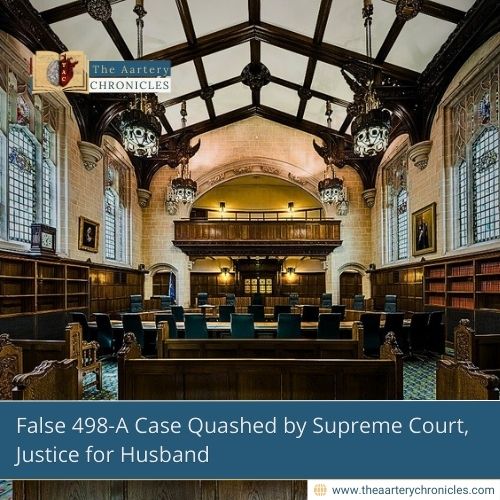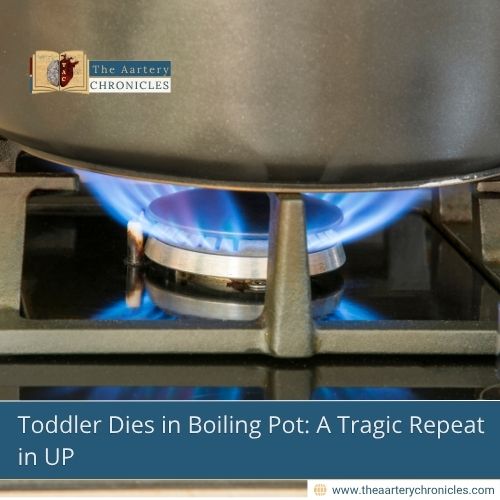

False 498-A Case Quashed by Supreme Court, Justice for Husband
Introduction
There has been a surge of false cases of domestic violence being filed by women against their husbands to seek divorce. In yet another remarkable judgement, the Supreme Court quashed a case filed u/s 498-A of IPC and other criminal cases filed by a woman against her husband, thereby ruling in favour of the husband.
The case history is as follows
A few years ago, a woman filed two FIRs, one in November 2018 and the second one in February 2019, with the police, against her husband and in-laws citing ill-treatment, and physical and mental abuse by them. She also complained that they gave her poisoned food, which led to the untimely demise of her unborn child. She also said that after giving birth to two daughters, her husband and in-laws assaulted her as she was unable to bear a male child and she was accused of birthing daughters only. This was the reason, that from February 2018, she chose to reside separately and she filed for divorce citing the above reasons.
She knew that he may not agree to the divorce so she falsely implicated him in criminal cases under Section 498-A of IPC- subjecting a woman to cruelty by husband or relatives, Section 313 of IPC – miscarriage without a woman’s consent, Section 312 of IPC – intentionally causing miscarriage, knowing full well that he would buckle under the pressure and agree to the divorce. At the outset, her husband ignored replying to her complaints and divorce notice, but gradually he succumbed to her demands and agreed to the divorce by mutual consent in May 2019. However, the criminal cases filed by her still had to be dealt with.
Given below are the conclusions of the Hon’ble Supreme Court proving that the woman had falsely implicated her husband and in-laws.
1. Case filed under ‘vague’ FIR – no specific details mentioned
The woman had lodged an FIR and filed a case under section 498A of IPC, which had no specific mention of bodily harm caused to her. On examining the FIR, it was concluded that no actual cruelty had been inflicted on the woman nor was she grievously injured or hurt to the extent to commit suicide or inflict harm to herself. There was no sign of any injury and no proof to show for it. Thereby this allegation was overruled. This ruling was based on the precedent “Jayedeepsinh Pravinsinh Chavda and Others v. State of Gujarat
2. Woman lied about her in-laws poisoning her and killing her unborn child
The woman alleged that she was given poisoned food by her in-laws which killed her unborn child. The doctor who had treated her for the “so-called poisoning “on 28 November 2016 said that the woman had taken a home pregnancy test a week before coming to the hospital and said that she was pregnant. She also mentioned that her stomach may still contain the abortion pills. The sonography confirmed that the woman had a seven-week-old foetus in her womb and she was bleeding.
Justice B.R. GAVAI of the Supreme Court ruled that the woman became aware of her pregnancy when she home-tested for it seven days before her hospital visit viz. the day of the incident. The FIR does not mention that the husband and in-laws were informed about the pregnancy, which is surprising considering the serious allegations made by the woman. The allegation that she was given food which was poisoned falls flat as how can they poison her if they are unaware of her pregnancy?
3. No evidence to prove cruelty
The woman said her husband and in-laws were cruel to her, but she was unable to furnish any evidence of the same.
The Hon’ble Supreme Court stated that this accusation cannot be taken at face value and there is no substantial evidence to prove the cruelty or constitute it as an offence u/s 498-A of IPC. Furthermore, the incident leading to miscarriage and the Doctor’s statement, as seen at face value, does not necessarily make it a prima facie case against the husband and in-laws. How did the incident of miscarriage or cruelty have no mention in the Divorce notice as the incident occurred in 2016 and the woman filed her complaint in 2018 after filing the Divorce notice? Why did the woman delay in filing her complaint? It is unlikely that she wanted to save her marriage as she had filed allegations u/s 312 and 313 of IPC and she had moved out of the matrimonial house. The Divorce notice had no mention of cruelty or the incident of miscarriage, though it mentioned other allegations like demands for money and jewellery and physical assault. The Court ruled it all out. This ruling was based on the precedent set in the State of Haryana and Others v. Bhajan Lal and Others.
4. Ulterior motives and using pressure to get a divorce
The woman had ulterior motives whereby she pressurised her husband for a divorce.
The Hon’ble Supreme Court thus concluded that the woman had made all these false accusations with an ulterior motive to obtain a divorce by putting her husband under undue pressure so that he would agree to comply with the divorce on her terms and conditions.
The Supreme Court referred to the precedent: Dara Lakshmi Narayana (supra) for this ruling.
5. Hon’ble Supreme Court states High Court showed a lapse of judgment by taking FIR on face value
The Supreme Court stated that the High Court had shown a lapse of judgment in this case by taking the FIR at face value instead of exercising its power u/s 842 of CRPC and quashing the proceedings to uphold justice and prevent misuse of Court processes. The ruling was based on the principles in the case of Bhajanlal (supra).
The Supreme Court, rightfully, ruled against the judgement of the Bombay High Court, Aurangabad bench, for criminal charges that were applied against the husband, and all FIRs and criminal proceedings filed against him and his family were quashed. Thus, serving justice to the man and his family.
This is a remarkable instance where the husband and his parents fought and won all the cases in the Hon’ble Supreme Court and all the web of lies spun by his wife was exposed.
Satyameva Jayate.

Ms Rupal Sonpal
Reviewed by Dr Aarti Nehra (MBBS, MMST)








